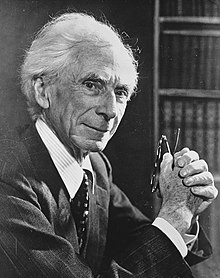“The first thing to realize…is that most people go through life with a whole world of beliefs that have no sort of rational justification, and that one man’s world of beliefs is apt to be incompatible with another man’s, so that they cannot both be right. People’s opinions are mainly designed to make them feel comfortable; truth, for most people is a secondary consideration.”
― Bertrand Russell
In all respects to Bertrand Russell, the logic is not tight in the way that it is assumed, and following the distinction between reference and meaning (semantics), Russell fails to appreciate the gap in ordinary language:
- “one person’s world of beliefs is apt to be incompatible with another man’s, so that they cannot both be right,” in particular cases, true. These are cases where the ‘world of beliefs’ are committed to the destruction of another’s worldview.
- “one person’s world of beliefs is apt to be incompatible with another man’s, so that they can be both be wrong,” in particular cases for totalising ‘the other’ in an intolerant space adjoined by the failure in fair evaluation, of the hard distinctive-making. For example, the ‘world of beliefs’ between worldviews of fundamentalist Christians, ‘terror’ Muslims, prejudicial Buddhists, ‘glorifying the evil’ Pagans, and militant Atheists, etc.
- “one person’s world of beliefs is apt to be incompatible with another man’s, but that they can both be compatible,” in cases where pluralistic values for ‘the other’ has compatible space adjoined by common evaluation, not of the distinctive-making. For example, the ‘world of beliefs’ between worldviews of liberal Christians, moderate Muslims, non-judgmental Buddhists, ‘do-no-harm’ Pagans, and stoic Agnostics, etc.
Image: Bertrand Russell. File:Bertrand_Russell,_Bestanddeelnr_909-1508.jpg . Wikipedia.
The following two tabs change content below.
Neville Buch
Professional Historian at Professional Historians Association (Queensland) Inc.
Neville Buch (Pronounced Book) Ph.D. is a certified member of the Professional Historians Association (Queensland). Since 2010 he has operated a sole trade business in history consultancy. He was a Q ANZAC 100 Fellow 2014-2015 at the State Library of Queensland. Dr Buch was the PHA (Qld) e-Bulletin, the monthly state association’s electronic publication, and was a member of its Management Committee. He is the Managing Director of the Brisbane Southside History Network.
Latest posts by Neville Buch (see all)
- J. D. Vance’s Insult to America is to Propagandize American Modernism - July 26, 2024
- Why both the two majority Australian political parties get it wrong, and why Australia is following the United States into ‘Higher Education’ idiocy - July 23, 2024
- Populist Nationalism Will Not Deliver; We have been Here Before, many times… - July 20, 2024


“People’s opinions are mainly designed to make them feel comfortable; truth, for most people is a secondary consideration.” Has this ever rung more true than the early years of the 21st century. In the face of existential crises it seems to me that opinion tops truth. Opinions based on old world views attempt minimise or deflect any particular crisis. Just a generation away from world wars, two generations of modern medicine and a few more generations of industrialization humanity seems unable to comprehend any existential threat. Society retreats to opinion, opinions that make us feel comfortable, … it cannot really… Read more »
Certainly, that part of Russell’s quote is correct about worldviews. We are all comforted by something about the worldview we adopted; however, therein is the challenge. The worldview, at one time, adopted is not merely ‘old’ but changes. To have an outlook, usually means putting together fragments from other worldviews.
Spot on Neville. I intend to include a link to this in my next talk as i ingest it and include it in my world view.